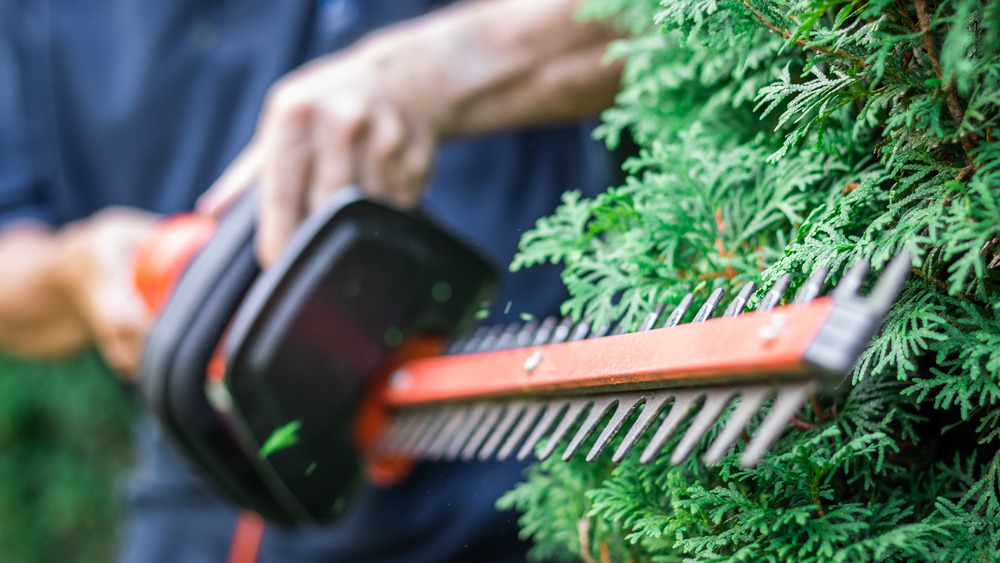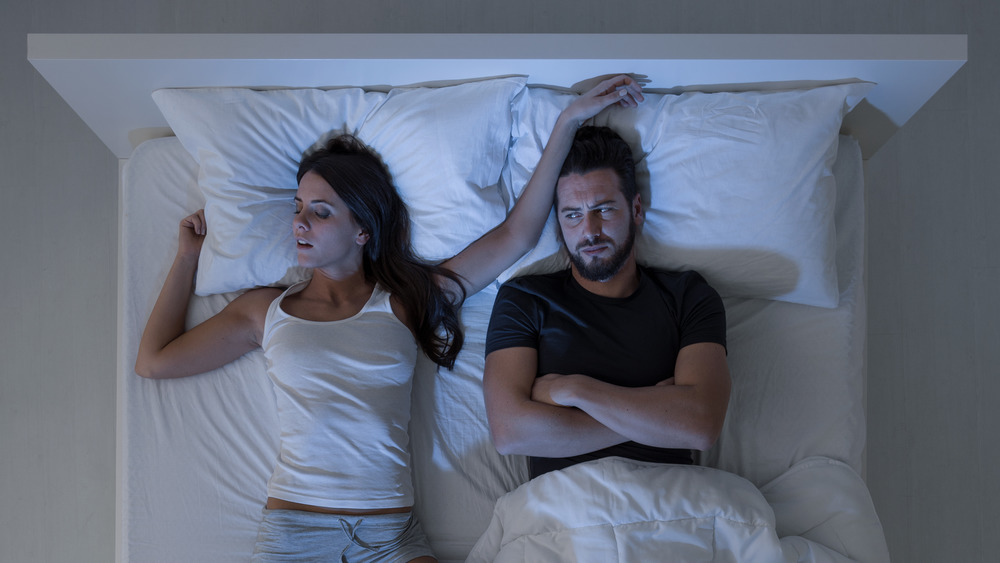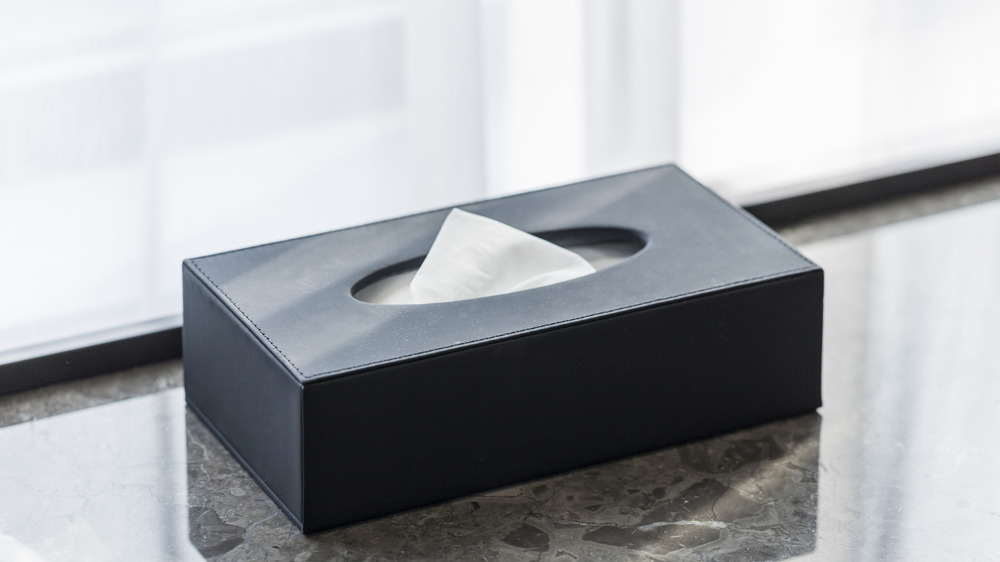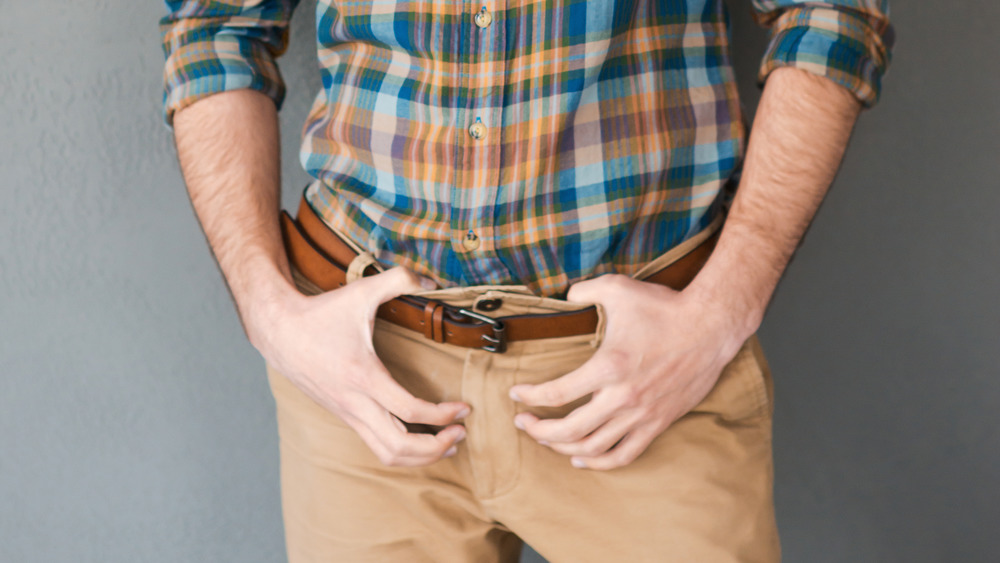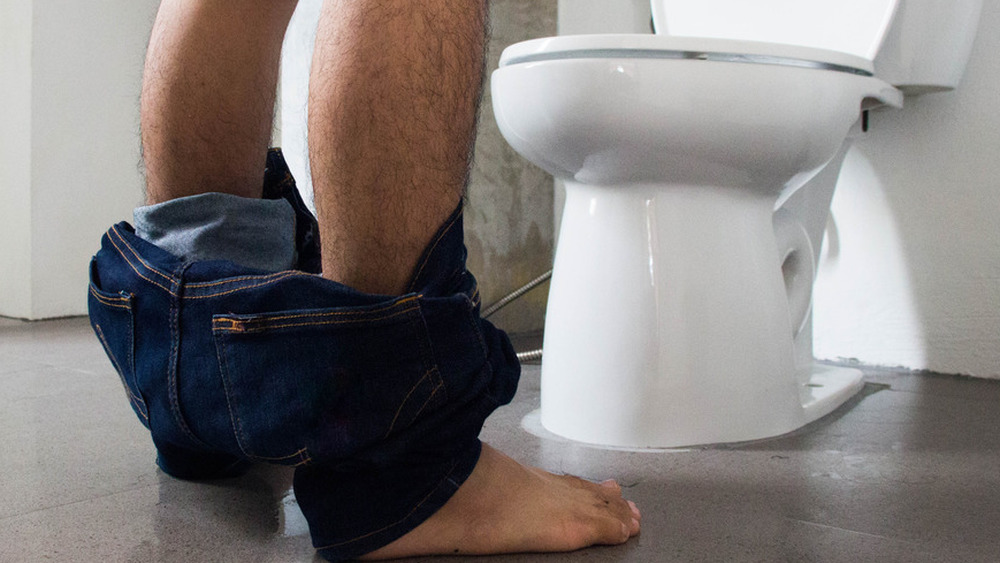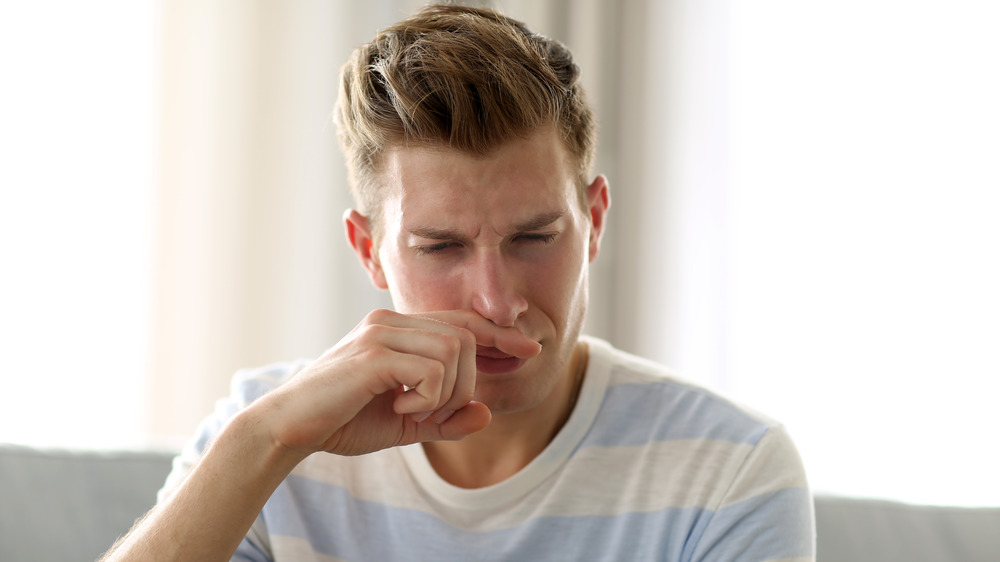What Every Man Secretly Does To His Body But Would Never Admit
Do men care more about their cars than their bodies? That might be the impression you'd get from a 2015 survey, which found 80 percent of men were able to remember the make and model of their first car, but only 50 percent could recall the last time they'd had a check-up at the doctor's office.
Other research has shown that men who hold the most stereotypically "masculine" ideas are the most likely to put off seeing a doctor. And they prefer male doctors, even though men who see a female doctor are more likely to be honest about their health symptoms (via Rutgers).
It's pretty clear that guys don't like talking about their bodies — even when their health is at stake. Is it any wonder then that so much about what men do is mysterious, if not downright inexplicable? Even science doesn't have all the answers. But we can at least pull back the curtain a bit. Here's a look at what every man secretly does to his body (though he'd probably never admit it).
Men sit too much
It's safe to say many guys like to think of themselves as fit, athletic types. However, there's a good chance that even dedicated gym rats spend more time sitting than is good for them. While too much sitting is unhealthy, according to Mayo Clinic, the solution is not to balance out sitting time with exercise. Instead, you should avoid spending big chunks of time being sedentary.
"Thinking that you can sit all day and then just go to the gym at night and counteract all that sitting — that would be false," Michael Fredericson, physician and director of PM&R Sports Medicine at the Stanford University Medical Center, told Men's Health. "Our bodies were meant to move."
The American Heart Association, for example, has stated that even people who exercise regularly could be at increased risk for heart disease and stroke if they spend too much time sitting down. On the other hand, studies show that taking five-minute walks, spending less time sitting overall, and taking multiple breaks to get up and move throughout the day have been found to offset this risk.
Men groom below the equator, sometimes with bad results
Guys like a neatly mowed lawn, but you might be surprised how many of them extend that predilection to do some personal manscaping. In one study of college-aged participants, 95 percent of the men and women reported removing at least some pubic hair in the previous four weeks, and 49 percent of those men preferred shaving over other means of hair removal. Additionally, a 2017 survey published in JAMA Dermatology found that 66.5 percent of men aged 18 to 65 had some history of pubic hair grooming.
That study also found that nearly a quarter (23.7 percent) of the men reported having injured themselves in the process at least once. Laceration was the most common injury, and the scrotum was the most common site of misfortune. Experience seems to play a role here; injury was more common among younger men, and those who'd started grooming earlier in life.
Grooming in a standing position was associated with a higher likelihood of injury. Fortunately, only a small fraction (9.3 percent) of injuries resulted in an infection, and even fewer cases (2.5 percent) required surgery or sutures.
Men get aroused while they're asleep
Yes, even asleep, it seems guys have one thing on their mind. This was one finding in a Sleep study of "dream-enacting behaviors" — that is, making motions and actions while dreaming, like talking in your sleep, moving your arms and legs, sleepwalking, or waking up crying or frightened during a nightmare. Typically our brain keeps us from making movements while we dream, but it can still happen, sometimes due to a sleep disorder. Researchers found that 98 percent of participants had experienced a dream-enacting behavior at least once.
There was only one statistically meaningful difference between the male and female survey respondents: Men were more likely to report sexual arousal relating to the behavior, while women reported more emotional reactions, like crying, laughing, speaking, or fear. Nighttime arousal is actually a pretty common thing that happens to the male body; men can have several erections during the course of the night. Not all of them are linked to arousal though (via Cleveland Clinic).
Men stay awake longer than their bed partner
You may think that men immediately go to sleep after sex, but that's not true — or at least it's not true that they're more likely to do so than a female partner. As part of a study published in Journal of Social, Evolutionary, and Cultural Psychology, researchers investigated what goes on during the "post-coital time interval." They surveyed 456 sexually active college-aged men and women who identified as heterosexual, but questioning them on their sleeping habits revealed no statistical difference between reports of men or women being the first to doze off.
However, the data showed that if no sex occurred between a couple, women were more likely to fall asleep first. According to the researchers, this could be the remnant of a "mate guarding" instinct on the part of men, to prevent their partner from sneaking away for a tryst with another caveman. Or it might be due to men holding out hope that their partner will get in the mood. Or perhaps it's the woman's way of shutting that conversation down so she can get some rest already.
Men put themselves in harm's way when they get stressed
A large body of research suggests that men, in general, take more risks than women. This may contribute to the higher rates of alcoholism, death from car accidents, risky financial decisions, problem gambling, and other risk-related consequences among men. It also seems that risky behavior is a way that men handle stress. A study published in PLOS One examined this by having men and women participate in a standard computer game that measures risk-taking: They could earn money by inflating an on-screen balloon, but would lose it all if they inflated it too much and the balloon broke.
Under normal conditions, men and women inflated the balloon an equal amount, indicating an equal tendency to take a risk. But when put under stress by placing a hand in ice cold water for three minutes, men tended to take more risks in the game, while the women did not. The researchers suggested that men and women may have inherited different responses to stress because, evolutionarily speaking, our male ancestors fought for territory, while our female ancestors needed to be more cautious about putting their young in danger.
Men engage in self-love the most
Yes, women also do it. But men take the gold here. Not that it's a competition — how would the judging even work? Anyway, according to data collected by the National Survey of Sexual Health and Behavior from Indiana University, most Americans have masturbated at least once. Among men between the ages of 18 to 59, most said they'd done it in the previous month, with the highest percentage being 68.6 percent of men aged 25 to 29. Among women aged 18 to 59, only in the 25 to 29 age group did a majority (51.7 percent) report practicing some, uh, self-love in the previous month. In fact, men outpace women at every age group.
A separate study published in the Journal of Sex & Marital Therapy found that 61 percent of adult men and 38 percent of adult women did the solo deed at least once in the previous year. Even among people 75 years or older, 27.9 percent of men reported masturbating in the previous year, compared to 16.4 percent of women, a study in the The New England Journal of Medicine revealed. The extra me-time may actually be good for a guy's health, as some (inconclusive) evidence suggests more frequent ejaculation is protective against prostate cancer.
Men use the crotch display
An unconscious behavior that body language experts call the "crotch display" is one of several signals that a man is attracted to someone. And it's pretty much what it sounds like: standing or sitting with legs spread, loins in full view. Other cues for attraction include stroking his tie or lapel or pulling up his socks, buttoning and unbuttoning his jacket, and touching his face (all of which are forms of preening or grooming, and signs of nervous energy), according to Today.
Sometimes men will also hook their thumbs into their belt loops, essentially pointing towards what he considers his best feature. "Men use this gesture to stake their territory or to show other men that they are unafraid," body language expert Allan Pease told She Said. "This gesture tells others, 'I am virile — I can dominate,' which is why it's a regular for men on the prowl. Apes use the same gesture, but without a belt or trousers."
Men are more likely to get injured and killed on the job
A number of factors contribute to the fact that women live longer than men. Of course, "individual risk factors, such as smoking, diabetes, or a strong family history of breast cancer, can outweigh the general tendency for women to live longer," Harvard Health Blog explained. But in general, men die earlier. One such reason for this is that men are more likely to be employed in dangerous jobs. In fact, compared to women, men are ten times more likely to be killed on the job, according to Forbes.
In 2019, 4,896 men suffered fatal occupational injuries, compared to 437 women (via Statista). As Forbes revealed, fishing workers had the highest fatal injury rate, followed by logging workers, aircraft pilots, and roofers. Transportation incidents, including crashes and other accidents involving land vehicles, trains, or aircrafts, account for the biggest shared of fatalities. Overall, the safest jobs are indoors and require some college education, while the most dangerous involve working outdoors and operating equipment.
Men spit, just because
Public spitting isn't as common as it used to be, in part thanks to widespread anti-spitting legislation that was intended to prevent the spread of tuberculosis at the dawn of the 20th century. Truth is, the risk of the deadly lung disease being transmitted via spit was probably exaggerated, according to a 2012 academic paper on the subject. These "anti-spitting campaigns" were at least partly about eliminating a gross habit that American men had been indulging in since the colonial days. Charles Dickens famously complained about it when he toured the states in 1842 (via BBC News).
Public spittoons may be a thing of the past, but who hasn't witnessed somebody casually launch a gob of wet saliva onto the sidewalk — and isn't that somebody usually a dude? The connection between spitting and manliness is cultural, not biological, according to dentist and author Susan Maples.
She told Women's Health that there's no evidence that men produce more saliva than woman, nor do men have some other physical reason that they must share their saliva with the world. It's just a learned, habitual way of expressing manliness. That said, please don't do it. Men's Health reminds us that there's no danger in keeping that spit in your mouth or swallowing it.
Men get the pee shivers
Sometimes called by the pseudo-scientific name of "post-micturition convulsion syndrome," the phenomenon of feeling a sudden shiver while urinating — aka pee shivers — isn't well studied (via Healthline). Though, this is perhaps as it should be; science has more important problems to solve, after all. Anecdotally, pee shivers seem to be a mostly male experience.
The cause of the sometimes messy bathroom occurrence isn't known, gastroenterologist and author Anish Sheth told NBC News. He explained that one theory pins the reaction to a result of blood pressure lowering during urination. Sometimes this natural blood pressure drop is large enough to activate a corrective response from the nervous system, which triggers the shivering reflex as a side effect. He also noted that since men urinate standing up, they're more likely to feel the effect of blood pressure dropping, which could be why the experience is more common in men.
Men seem driven to smell themselves ... down there
There are different names for this maneuver, but we'll call it the ol' scratch and sniff. Often it starts as a routine below-the-belt adjustment, but once his hand is out of his pants, there's an almost irresistible urge to take a whiff of those busy fingers . A Reddit thread sharing disgusting things men do in private revealed this to be a pretty common activity (via Men's Health). No judgment on what takes place in the privacy of one's own home and shorts. But on the other hand, guys, whhhhy?
It's been suggested that this is some kind of hygiene instinct. But the explanation may actually be surprisingly existential. In an interview with MEL magazine, biopsychologist Nigel Barber speculated that the behavior is akin to looking a mirror. "The perception of self may elevate mood and boost self-esteem," he said. According to this theory, perceiving our own body odor remind us that we're unique individuals, reinforcing our sense of self.
Men rate themselves as healthier than they actually are
You have to admire the optimism. In a Mayo Clinic study that queried nearly 3,000 men and women about how they viewed their own health, men and women had equal confidence in their ability to eat a healthy diet. However, men tended to have more confidence than women that they could maintain healthy exercise habits.
The numbers also showed that men and women rated themselves as equally healthy. That might seem fine, except that the men in the study had higher rates of health problems like hypertension, high cholesterol, cigarette smoking, and diabetes. That suggests a gap between perception and reality, according to the researchers.
"We were surprised by the finding that men felt they were as healthy as women despite having more medical problems," said Richa Sood, internist and author of the study, in a statement about her research. Understanding how men and women think differently about their health and their health habits could lead to gender-targeted wellness services, she added.
Men eat unhealthy food because it's more manly
Research shows that men and women eat differently. Scientists have been documenting this for a while now (via ScienceDirect). Men have been found to eat a less healthy diet, but what is it that motivates this dietary difference?
The answer seems to be wrapped up in cultural beliefs about masculinity and femininity. A pair of experiments published in Social Psychology investigated this by having volunteers complete a word puzzle task that included stereotypically masculine or feminine terms ("football" or "ballet," for example). Then they polled the study subjects for their food preferences. The results showed that exposure to masculine words made people more likely to favor unhealthy versions of the same food (like fried chicken versus baked), more likely to say they would eat unhealthy foods in the future, and less likely to claim specific healthy eating behaviors, like eating more vegetables.
A follow-up study found that people rated food as better tasting if it came in gendered packaging that matched a stereotype: A "mega" muffin in masculine packaging was rated higher than a "health" muffin in the same packaging. These results not only show that less healthy foods are considered masculine, they imply that subtle use of this effect (e.g., a healthy muffin labeled a "Mega Muffin") could influence people to make healthier choices.
Men eat more in the company of a woman
Who should pay when a man and a woman go out to lunch? In terms of fairness, maybe the guy. Why? Because chances are that he's eating almost twice as much as he does when dining alone.
In a study conducted at an Italian restaurant, researchers tracked the amount of pizza and salad consumed by customers during an all-you-can-eat lunch buffet special. Although the diners knew they were participating in a study, they didn't know it was about their eating habits. In the end, researchers found that men who were dining with women consumed 93 percent more pizza and 86 percent more salad than men eating with other men. Women's eating behavior, on the other hand, didn't change based on dining partners.
According to the researchers, this behavior may be an evolutionary one, a type of "showing off" that men unconsciously do in the presence of women. Overconsumption is a hazardous act, though, since it can lead to health problems (via Healthline).



